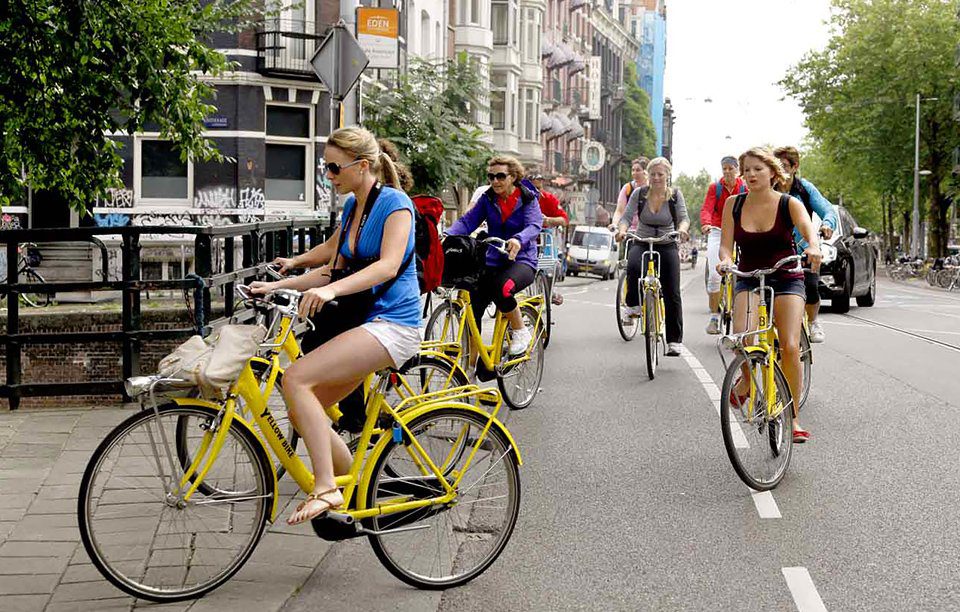Amsterdam based Sabine Reijm from Sea Going Green analyses her own city’s challenges to help break down the solutions in what is a complex topic.
In global cities around the world, tourists have become a subject of irritation among the locals.
Here in Amsterdam, tourists’ reputations and stereotypes range from their inability to cycle, their wandering aimlessly around the cramped canal streets on soft drugs or not paying attention to their surroundings while taking selfies around monuments or bike paths.
For locals around the world that have been “invaded”, tourists represent the “awful other” and in many cases the “necessary evil”.
The impact of heavy tourism only scratches the surface of what negative impacts this can leave behind if nothing is done to regulate it.
This topic has become more and more relevant and many studies on the impact of tourism and the importance of sustainable tourism have been commissioned.

It’s us vs them – Or is it?
One of the most well-known studies, The Travel Foundation’s “The Invisible Burden of Tourism” discusses some of the biggest environmental issues including increasing waste and traffic flows and the amount of CO2 produced by the commercial aviation industry (around 9% of all global emissions).
The combination of studies and interest in sustainable tourism have stimulated proposals from key individuals across the sector to solve problems such as these through innovation, giving hope that the negative impacts from tourism can be mitigated.
To understand the “Us vs. Them” dynamic that we see stemming from the growing tourism industry, we must ask ourselves if it is possible to contain the flow of tourists in our contemporary society. It has been a proven fact that the increasing number of tourists worldwide has had a negative effect on nature and the overall state of our environment.
Global cities are also becoming more popular amongst suburbanites who want to live in a city and near places that are attractive to tourists for better job prospects and a more vibrant setting.
In this case, even domestic residents themselves also contribute in this way to the increasing pressure on destinations. They behave more and more like long-stay tourists in their own cities while blaming the short-stay tourists around them.

We envision tourists as visitors in our city or even our “domain”– “us” also includes people who have integrated into the city after only a few weeks or months. In the media as well as in policy reports, tourists are often defined in terms of leisure tourists, also known as the ones who travel in large groups and often do not come from European countries. Sometimes the way that they are framed takes on xenophobic characteristics.
What is remarkable in the analyses of different outlets is that ‘mass tourism’ revolves around the stereotyping of, for example, Chinese tourists. The increasing number of business tourists seems to be disregarded. This likely comes down to perceived cultural differences and the direct and potentially negative interactions that the local population has when in contact with the tourist group.
In problem analyses of over-tourism, there is increasingly less attention for business tourists who visit the city for work, people from other cities or visitors from the region.
So, what can be done to reverse the negatively associated stereotypes of “mass tourists”? The city of Amsterdam, for example, has already started by limiting Airbnb (more tourists staying in their designated area, less negative interactions and ending the stereotypes of tourists taking over the city and perpetuating the housing crisis).
Furthermore, Amsterdam is trying to spread out tourists by creating other attractive parts of the city away from tourist hotspot zones and neighbouring locations (this also diversifies tourism spending, which stimulates more local economies).

What could the positive impact of change be?
When residents see less tourism affecting their daily lives and more tourist money going into improving the country and their own city and neighbourhoods, then their attitude will likely be more welcoming and maybe even less divisive.
This is, of course, future perspective, which is not entirely up to the citizens to create. What we can do, however, is try to be open for the productive coming together of differences.
Many residents in big cities are ex-pats, commuters who spent 40+ hours in the city, students, or digital nomads who stay in the city for a few months. Are they residents or visitors? They can not vote, but are part of the city and contribute to the city’s economy.
Within managing overtourism, choices will have to be made that might not please everyone but have the potential to open up the possibility for new questions regarding tourists, residents and visitors.
Sea Going Green is a Sustainable Tourism Consultancy helping companies capture economic opportunity through sustainable tourism development.
Find out more at www.seagoingreen.org
How can you travel to change the world?
Congratulations! By reading this post and taking some of these insights on board, you’ve already made a difference.
Now you can easily create your impact by sharing your new-found knowledge with other friends who you think would also be interested.
Ultimately, responsible travel comes down to common sense – stay curious, keep yourself up-to-date with the challenges at hand and make yourself accountable for your actions on your travels.